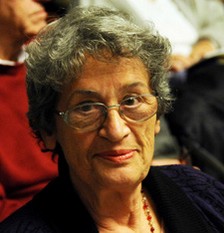
Mirjana Živković (Serbia) is a composer, music pedagogue, and theorist. She acquired her BA and MA degrees in composition at the Faculty of Music in Belgrade and then also studied with Nadia Boulanger and Olivier Messiaen in Paris. Between 1964 and 1976, she worked as a professor at Josip Slavenski School of Music in Belgrade. In 1976, she became an assistant professor at the Faculty of Music in Belgrade, and then an associate and full professor (she was Head of the Theory Department from 1998 to 2001). She has won a number of important awards: Belgrade Radio-television Award and Stevan Hristić Award in 1964 (for Sinfonia polifonica for symphony orchestra); first prize of the Conservatoire at Fontainebleau, France, in 1968 (for Basma/Incantation, for voice and four timpani); a SOKOJ Award in 1982 (for Malo šaljive varijacije / Somewhat Humorous Variations, for piano); first prize of the Composers’ Association of Serbia in 1982 (for Domaće životinje / Domestic Animals, for children’s choir with piano); the golden plaque of the University of Arts in Belgrade for her work in teaching in 1997; and the Lifework Charter of the Union of Music and Ballet Teachers’ Associations of Serbia in 2004.
Beside a number of orchestral, concertante, and choral pieces, Živković’s compositional oeuvre comprises chamber works in various genres, performed in Serbia and abroad. Also, she has authored a large number of textbooks and music-theory studies, most notably concerning the work of Josip Slavenski, whose musical legacy preoccupied her for a number of years. In addition to her awarded pieces listed above, one should also mention her Koncertantne metamorfoze (Concertante Metamorphoses) for piano and orchestra; Adagio and Allegro for oboe and string orchestra; Dve romantične pesme (Two Romantic Songs) for mezzo-soprano and chamber orchestra; Balada o polju (A Ballad about a Field) for violin and chamber orchestra; Agitato for violin and harp; Igra (Dance) for mezzo-soprano, flute, and percussion; two Ballads for piano; Letnja noć (A Summer’s Night) for accordion; Tri načina (Three Modes), a suite for flute and piano; several cycles of solo songs, etc.
Balada o Dositeju(A Ballad about Dositej), for baritone and piano. Some years ago, I attended a festivity organised by the Dositej Obradović Endowment in honour of their founder. On that occasion, I heard a poem, “Vetronoscu Dositeju” (To Dositej the Wind-bearer), which I rather liked, so I asked its author, Marija Bišof, to allow me set it to music. I made the first draft quite quickly, but it was only in 2017 that I remembered that unfinished piece again. The life of Dositej is a true source of inspiration – from a modest pupil at a monastery to the most education person of 18th-century Serbia. Always thirsting for knowledge, he travelled throughout Europe and applied himself to the enlightenment of his people. The words of the poem touch upon his fascinations, which I sought to convey in my music as well.


